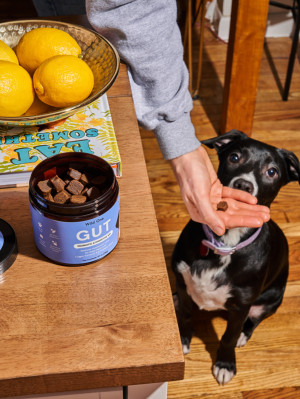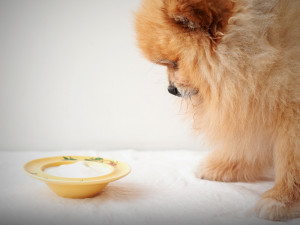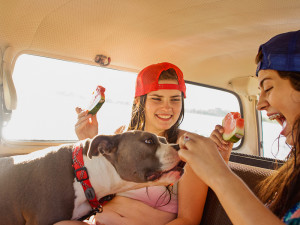Is Yogurt Good For Your Dog?
Yep, dogs can eat yogurt — it’s safe and healthy, and most dogs love it.

share article

Your pet wants you to read our newsletter. (Then give them a treat.)
Yogurt is a wonder food packed with probiotics, protein, calcium, B-12, and other nutrients, and oh so popular with people. Some yogurts are healthier than others, but all forms of yogurt are made by the bacterial fermentation of milk, and the best yogurts, contain live “cultures” (friendly bacteria). These microorganisms can help keep gut bacteria in balance. So, you might be wondering if your pup can enjoy the benefits of yogurt too? Read on.
Can dogs have yogurt?
Yep, dogs can eat yogurt — it’s safe and healthy, and most dogs love it. Yogurt has many benefits for dogs; some health benefits include aiding digestion, easing diarrhea, and boosting immunity, and it’s often easier to digest for dogs than other dairies because it contains less lactose.
Curious how to incorporate this superfoodopens in a new tab into your pup’s diet? Add a dollop of yogurt to your pup’s kibble as a toppingopens in a new tab, give them a frozen yogurt treatopens in a new tab, or use it to disguise their medication. Yogurt can also be used to ease separation anxiety or keep pups busy by using plain yogurt (along with some peanut butter and kibble) as a kong stuffer. Just remember that treats should make up no more than 10% of your dog’s daily caloriesopens in a new tab, so keep an eye on the calorie counts with this high-calorie food.
Is yogurt good for dogs?
Yogurt is a good source of protein, calcium, phosphorus, B-12 vitamin, and riboflavin. The protein within yogurt comes in two forms: whey and casein. Whey protein is considered a complete protein containing all nine essential amino acids and low lactose content. Yogurt also has friendly live bacterial cultures (probioticsopens in a new tab), which provide many digestive health benefits.
Yogurt can be helpful for some dogs to resolve minor GI problems. If your dog has a tummy ache, a bit of yogurt can help them get back to normal. For minor stomach upsets, vets will often recommend fasting — feeding only white rice — for a short period of time to help restore your dog’s normal gastrointestinal flora. “Try white rice (1 cup), chicken baby food (1 jar), and yogurt (1 tbsp) several times daily,” says Dr. Greg Martinez in his discussion on diarrhea in dogs.
The latest research shows a huge connection between gut bacteriaopens in a new tab and the health of the rest of the body. Studies show that keeping the GI microflora in balance can help with:
Allergies
Boosting immune system
Behavioral problems
Colon cancer
Inflammation
Obesity
But because yogurt is a high-fat food, the benefits of active cultures may be limited for dogs (some vets recommend using supplements instead). In his book, The Dog Diet, Greg Martinez, DVM, says, “I used to recommend yogurt for probiotic effects but found that most yogurt has low levels of bacteria and may be less effective than the probiotic power of capsules.”
While yogurt has plenty of nutritional benefits for your dog, there are also a few worries to watch out for. Lactose-intolerant dogs may not handle yogurt well. And some yogurts have additives that are toxic to dogs. Yikes. So, how do you know what yogurt is okay for dogs?
Types of yogurt that dogs can have.
The best yogurt for your dog is simple plain yogurt. Serving your dog plain yogurt ensures they aren’t exposed to unnecessary additives, sugars, and dangerous sweetenersopens in a new tab. But because not all yogurts have the same ingredients, it’s best to check the label. For dogs, the best yogurt includes:
Plain yogurt
Unsweetened
No additives
No xylitol (sometimes called birch sugar)
Low-fat
Active live cultures
What about Greek yogurt for dogs?
Dogs can eat Greek yogurt, too. Greek yogurt is considered healthier than standard yogurt because it contains more of those beneficial live cultures. While both Greek yogurt and regular yogurt are made from the same basic ingredient (milk), Greek yogurt is thicker, creamier, contains less sugar, and has more protein. Dogs with lactose intolerance who may not be able to enjoy regular yogurt might try Greek yogurt, which has lower levels of lactose.
Can dogs have flavored yogurts?
Two common household yogurts: fruit-flavored and vanilla, are also not recommended for dogs. Dogs shouldn’t eat strawberry yogurt, or other store-bought fruit yogurts, because they contain excess sugars (or toxic artificial sugar). Likewise, vanilla yogurt also contains too much sugar for dogs. For a healthier option, pair fresh fruitopens in a new tab, like blueberries or strawberries, with plain regular yogurt or plain greek yogurt.
Yogurt treats for dogs.
Treats made with quality ingredients can get quite expensive, especially if you do a lot of training. So, making dog treats at home from time to time can help save on your budget and ensure that your pup is getting the right stuff. Here’s a wonderfully simple yogurt dog treat recipe that dogs love, especially during the warm summer months.
Can dogs have other dairy products?
Many dogs can have dairy products such as cheese, milk, cottage cheese, and ice cream in moderation — as a treat. Cheese is a very popular high-value dog training treat. Cutting up cheese into tiny bite-sized pieces makes for an excellent and super rewarding reinforcement for dogs, but beware, cheese is also high in fat. It’s best to feed in moderation and use alternative treats for the bulk of your dog training (otherwise, your dog will likely suffer an upset stomach).
Some dogs with a sensitive stomach or lactose intolerance may experience stomach aches (and diarrhea) after eating any amount of dairy products like milk or cheese, which have higher lactose levels. As with any new food, introduce dairy products to your dog slowly and in small quantities. You might find your dog doesn’t like the smell or taste — not all dogs do — or they may be lactose intolerant. To be safe, contact your vet before making significant dietary changes, about appropriate caloric intake, or before introducing new foods.

Daniela Lopez
Daniela Lopez is a digital media specialist and long-time contributor to The Bark.
Related articles
![Man crouching down to let two dogs eat out of a bowl]() opens in a new tab
opens in a new tabHow Many Treats Is Too Many?
The key to curbing mindless snacking — this is for your dog.
![A person giving a banana to a dog.]() opens in a new tab
opens in a new tab10 Fruits and Vegetables That Your Dog Can Feast On
Indulge your pup (safely) with these delicious and healthy snacks.
![Side view of a cute hungry dog standing next to a red bowl with food in a studio with white background]() opens in a new tab
opens in a new tabHow to Get a Dog to Eat
You can’t appease a picky dog with fish fingers like you can with your toddler. Here are some things you can do
![Teenagers Feeding a Dog Watermelon While Sitting In Car On a Sunny Day]() opens in a new tab
opens in a new tab9 Healthy Summer Snacks to Share With Your Dog
Your pup wants in on your crudité platter.





